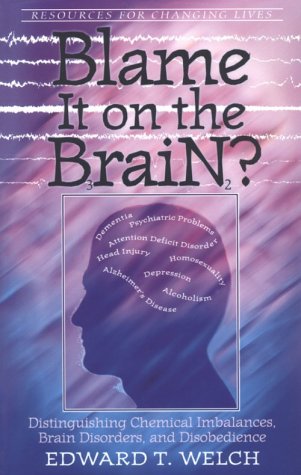Quotes about ADHD
With many children labeled ADD, the arena of the heart is ignored. Yet isn’t it possible that some of what we call ADD is sinful self-indulgence and laziness? Is it possible that a prominent cause of the behaviors is a heart that demands its own way? The truth is that ADD sits at an intersection where physical and spiritual meet. Like other psychiatric labels, the root cause may be physical or spiritual; it is typically both.
Blame in on the Brain? P&R Publishing, 1998, p. 137. Get this book!
Ritalin affects a number of areas of the brain, but its mode of action is uncertain. One thing, however, is clear. Ritalin does not treat any known chemical deficiency in a child’s brain. No one needs Ritalin. Like most psychiatric drugs (including the antidepressants discussed earlier), the best analogy would be to say that Ritalin-type drugs act like aspirin: they suppress symptoms in some people, but they are not a cure.
Blame in on the Brain? P&R Publishing, 1998, p. 142-143. Get this book!
It is imperative to stress that drugs cannot change a child’s heart. If a child seems more obedient when taking Ritalin, it is because an influence on the child’s life has changed. That is, in the same way that parents and peers can influence our hearts, so our bodies can influence us. Our bodies bring pleasure and pain, intellectual clarity and confusion. Such physical changes can act like a temptation to which some children respond sinfully. When the temptation is removed, these children might be less prone to certain kinds of sins.
Blame in on the Brain? P&R Publishing, 1998, p. 144. Get this book!
Parenting those with ADD symptoms is ultimately like parenting any child: you accommodate your biblical instruction to the child’s abilities. Parenting children who are like us is relatively straightforward because we instinctively understand their strengths and weaknesses. But children whose strengths and weaknesses are out of the mainstream require more careful observation and creative teaching. Remember that these children too have God-given strengths, and whatever weaknesses they have will not slow their growth in the things that are most important.
Blame in on the Brain? P&R Publishing, 1998, p. 144-145. Get this book!
Recommended Books

